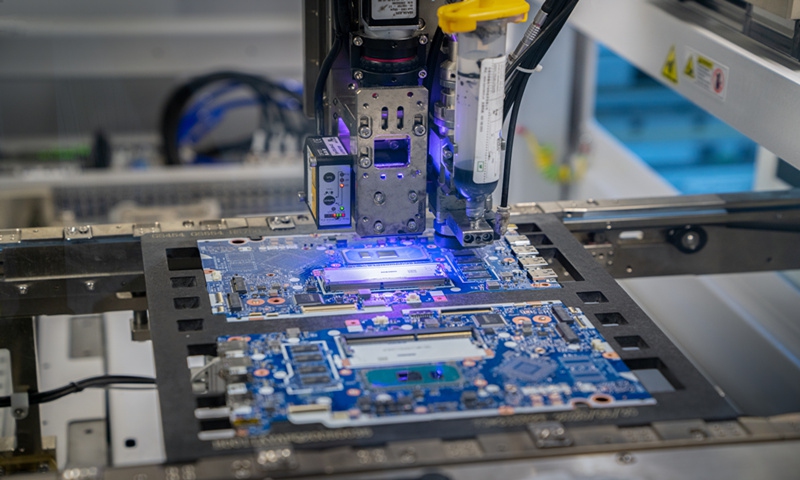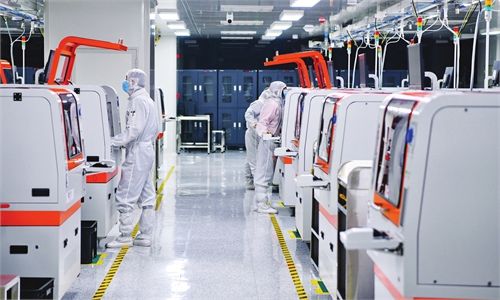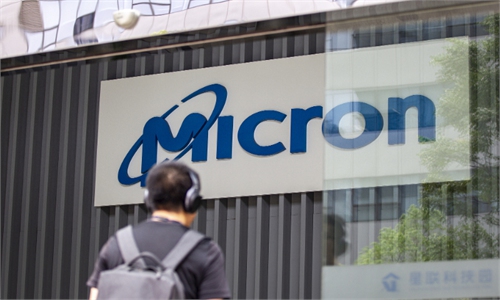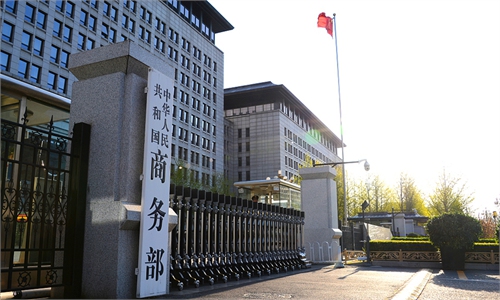
A chip manufacture machine Photo: VCG
Washington's semiconductor policy, including the CHIPS and Science Act, and its export controls are major economic and trade concerns of China, which are the key issues raised by Commerce Minister Wang Wentao in talks with leading US commerce officials last week, Shu Jueting, a spokesperson of the Ministry of Commerce (MOFCOM), said on Thursday.
"The two sides had in-depth exchanges on the matter and agreed to continue the discussion," Shu told a regular press conference in Beijing.
The US has intensified its crackdown on the Chinese high-tech sector in recent years, with semiconductor sector at the forefront.
In the latest move, some in the US are seeking to curb investment in Chinese chip industry. New rules under consideration would restrict the flow of US investments and know-how into Chinese companies working on advanced semiconductors, artificial intelligence and quantum computing, Reuters reported.
In response, Chinese Foreign Ministry spokesperson Mao Ning said on Thursday that China has noted the relevant reports and is paying close attention to developments.
"China firmly opposes the US politicizing and weaponizing economic, trade and technological issues, setting up obstacles to normal technical cooperation and economic and trade exchanges between the industry and the private sector, and disrupting the stability of global supply chains," Mao said.
Last week, Wang met with US Commerce Secretary Gina Raimondo and US Trade Representative Katherine in the US.
Chinese observers expected the meetings could pave the way for China-US trade and economic ties to play a stronger role in improving frayed bilateral relations.
When asked about outcomes of these talks on Thursday, Shu said both nations believed bilateral economic and trade relations are "critically important." The ministers exchanged views on trade issues of respective concerns, discussed possible areas of cooperation, and agreed to continue the dialogue.
It is hoped that the US will work with China to manage differences under the principles of mutual respect, peaceful coexistence, and win-win cooperation, and maintain and deepen bilateral practical economic cooperation, so as to benefit the two countries and their peoples and promote the development of the world economy, Shu said.
On Wednesday, China's international trade promotion agency announced plans to organize a delegation of entrepreneurs to visit the US in July, to "further strengthen the ties between the Chinese and American business communities and promote practical cooperation between enterprises."
Some top US CEOs have visited China over the past week. On Tuesday, Tesla Chief Executive Elon Musk kicked off a visit to China with a meeting with the country's foreign minister in Beijing, marking his return to the electric carmaker's largest production hub for the first time in three years.
JPMorgan CEO Jamie Dimon and Starbucks CEO Laxman Narasimhan were also in China this week, according to media reports.
From January to April in2023, the trade volume between China and the US reached $217.924 billion, a year-on-year decrease of 11.2 percent. Among them, China's exports to the US were $158.251 billion, a decrease of 14.3 percent; China's imports from the US were $59.673 billion, a decrease of 2 percent.
Global Times



